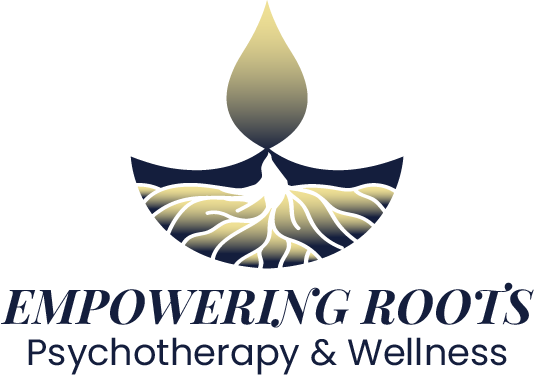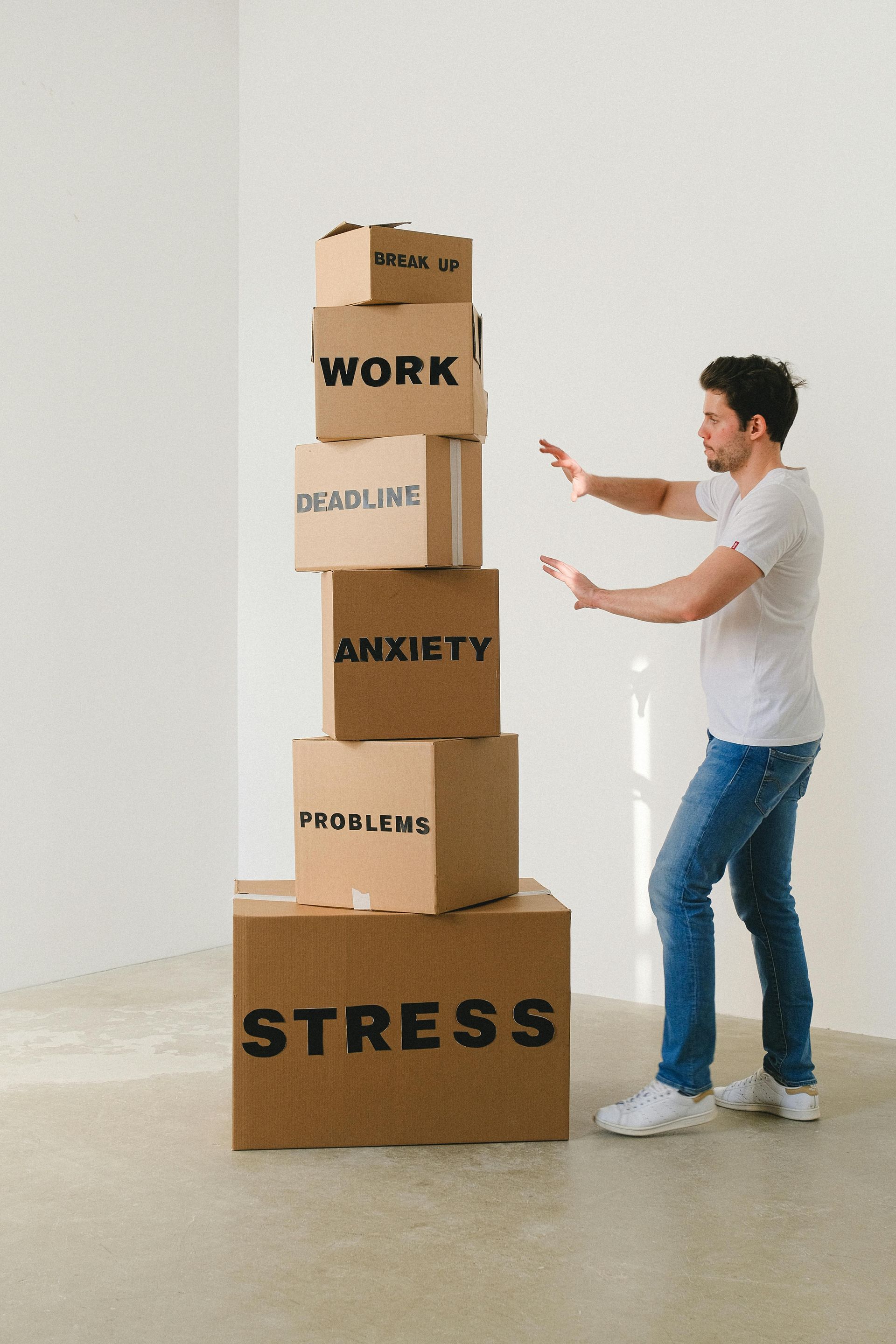Feeling Like a Burden? Emotional Neglect and South Asian Healing
Feel “too much” or guilty for needing support?
Learn how emotional neglect shows up in South Asian/BIPOC families—and how therapy helps.

"You learnt that being Perfect would always be rewarded and anything less than risked "othering" or becoming the black sheep or the family's cautionary tale."
Ever feel like asking for help makes you “too much”?
Many South Asian and BIPOC adults learn to stay small—help others, never need. That isn’t a flaw; it’s a wound from childhood emotional neglect. At Empowering Roots Psychotherapy and Wellness in Etobicoke (serving Brampton & Ontario online), we help you unlearn the shame that says your needs are a burden and build safety around being seen and supported.
“Needs are data—not drama.”
What is childhood emotional neglect?
What Is Childhood Emotional Neglect (CEN)?
Emotional neglect happens when feelings aren’t noticed, validated, or guided—even if food, shelter, and education were provided. In many South Asian, BIPOC, and immigrant families, love is shown through sacrifice and achievement, and often withheld when a child is deemed not to fulfill expectations or acts against the cultural norm.
If emotions were dismissed, you may have learned that needs = risk.
- Achievement over emotion – Growing up, love and approval often came with conditions. Straight A’s, scholarships, promotions, and “respectable” career choices weren’t just celebrated...they became proof of your worth. Even your choice of partner or decision to delay marriage might have been weighed against family reputation, cultural status, and "what others would say". Somewhere along the way, you learned that being accomplished mattered more than being at peace, and that success was the safest way to earn love. You learnt that being Perfect would always be rewarded and anything less than, risked "othering" or becoming the black sheep or the family's cautionary tale.
- Respect = silence – You might remember times you tried to share your feelings, only to be told you were being “too sensitive,” “rude,” or “disrespectful.” In your family, respect often meant swallowing your words, avoiding confrontation, and keeping quiet to maintain “peace.” Over time, speaking your truth started to feel unsafe, so you learned to keep it in, even when it cost you your voice, peace, and dreams of a future.
- Parentification – Maybe you were the one filling out forms for your parents, translating at the doctor’s office, smoothing over family arguments, or making adult decisions before you even understood what childhood freedom felt like. Being the “fixer” or the “responsible one” became your role—not because you wanted it, but because there was no one else to carry it. But when you had opinions, those were easily brushed aside with the claim that "you are too young" or "let the adults talk."
- Gendered roles – For a daughter, caretaking may have been an unspoken expectation: cooking, cleaning, supporting siblings, putting your needs last, being the one to give up your favourite piece of chocolate to your brother or younger sibling. You were expected to be the "good daughter who never says no". If you’re a son, you may have been told to “man up,” hide your tears because "men don't cry", and carry the weight of being the family protector. Either way, you learned early that gender came with rules about how you were supposed to feel, behave, and show up in the world.
How your nervous system adapted...
When “Being Seen” Felt Dangerous, Your Body Protected You
CEN trains your nervous system to keep you safe with patterns like
- people-pleasing (fawn),
- shutdown (freeze),
- perfectionism, inner critic, irritability (fight), and
- hyper-independence (flight).
PS: These are protective traits, not personality defects. Therapy helps retrain those responses so that connection feels safer. To heal and empower your people-pleasing parts, book an Empowering Chat Today
fawn • freeze • fight • flight
Signs you’re carrying this wound...
Signs This Might Be You
So let’s talk about you for a sec (don’t worry, this is a safe space).
- Asking for help? Yeah… you’d rather wrestle a mountain of laundry, three back-to-back deadlines, and emotional burnout alone than risk someone thinking you’re “needy.” Even when you’re drowning in tasks, you put on that “I’m fine!” smile like it’s an Olympic sport.
- And when you do dare to say “No”? Cue the guilt parade. You start wondering if you’re a bad friend, a bad kid, a bad partner, a bad sibling or just plain selfish. Spoiler: you’re not.
- Rest? Jokes! You only “rest” when you’ve earned it, which is usually after running yourself into the ground. Until then, you’re overfunctioning in every relationship, at work, and probably in the group chat too.
- Vulnerability? You’ve got a black belt in dodging that. Feelings? We don’t know her. You change the subject faster than a terrible Bollywood movie plot twist. But letting someone in doesn’t mean you’ll get hurt. It means someone might just hand you the tissues or help you feel whole and seen.
- “Too sensitive” or “too much,” they say. And you’ve started believing it. But here’s the hard truth: your depth, your feels, your ability to soak up meaning—it’s not “too much.” It’s too beautiful.
“You’re not broken...you’re just brilliant at surviving.”
Real-Life Impact
The Hidden Cost in Adult Life
- Relationships: Do you find yourself over-giving? And then feeling resentful or lonely, even when partnered?
- Career: Are you the reliable high-performer who can’t say “No,” and can’t switch off afterward?
- Mental Health: Is anxiety your baseline? Do sleep troubles, muscle tension, stomach pain, or being on “high alert” feel like your norm?
- Identity: Do you keep your own needs low-key to keep peace with family or community expectations?
You are not alone. Many clients seeking People‑Pleasing & Perfectionism Recovery at our Etobicoke clinic recognize these just-right-too-familiar patterns. You might feel that tight pressure over your chest or find yourself constantly on edge. These are common physical responses to anxiety and chronic stress—and yes, in case you were wondering, targeted Anxiety Therapy can help you work through that lingering “on high alert” feeling.
Learn more about our Anxiety Therapy and People‑Pleasing & Perfectionism Recovery services here
Why Asking for Help Feels Selfish
“I Don’t Want to Be a Burden”
If your early years taught you that needs equalled conflict, disappointment, or shame. It's no wonder your body learned that having needs = danger. Therapy provides a corrective experience: your needs do matter, and they're welcome here.
How Therapy for Guilt & People-Pleasing Can Help
What Healing Looks Like at Empowering Roots Therapy
We deliver culturally responsive, integrative, trauma-informed therapy, tailored for South Asian, immigrant, and BIPOC clients in Ontario, through Virtual Therapy and In-Person Therapy in Etobicoke.
1) Build Safety in the Body (Somatic & Regulation)
- Simple grounding and breathwork to shift from “constant alert” to “safe enough.”
- Learn to track body cues—so you catch stress before it spirals.
2) Inner Child & Parts Work
- Meet that younger you who thought, “It’s safer if I don’t need.”
- Begin offering that part of you validation and permission to feel.
3) Reframe Shame (CBT/DBT-Informed)
- Shift from “I’m too much” to “I learned asking for help was risky.”
- Learn skills for emotion naming, distress tolerance, and self-compassion.
4) Repair Boundaries—Without Guilt
- Define your bare minimums for rest, time, and emotional space.
- Try scripts like:
- “I want to help, and I also need to rest. I can call tomorrow evening.”
- “I respect you. I’m not able to discuss this now—let’s revisit Saturday.”
- “I can do X, but I won’t be able to do Y. Which is more important?”
5) Integrate Culture, Faith, and Identity
- Healing doesn’t mean rejecting your roots. We honour your heritage while releasing what harms your mental health.
If you're wondering if there is a therapist near you who gets it, book a Free Consult Today. Together, let's work on those people-pleasing parts and learn to overcome the guilt we may experience when we set boundaries or say "No".
A 5-Minute Practice to Build Your “Receiving” Muscle
- Place a hand on your chest or belly.
- Take a deep breath in and out. Notice what comes up for you. Acknowledge it and then take a few more deep breaths.
- Name a micro-need (water, stretch, 10-minute break, text a friend).
- Notice the inner story (“This is silly,” “Others have it worse”).
- Reframe with: “Small needs matter. Meeting them builds safety.”
- Act on it. Then note how your body feels afterward
Recent Posts


Why Somatic Therapy Might Be the Missing Piece in Healing Anxiety for South Asian & Immigrant Adults

Are you Looking For a Therapist Who Works With The South Asian Population in Ontario?
Finding a therapist who understands the unique pressures, fears, and challenges faced within the South Asian community can make all the difference in your healing journey. I know that cultural expectations, family dynamics, and personal struggles often feel overwhelming and can sometimes make it hard to reach out for support.
In my practice, I bring a deep understanding of these experiences, offering a space where you can feel truly seen, heard, and supported without judgment. Together, we’ll work toward breaking cycles, setting boundaries, and finding ways to honor your own needs while respecting your roots.
If you're ready to explore how therapy can support you, I invite you to book a free 15-minute consultation. Let’s talk about how we can work together to help you find relief, strength, and clarity.









